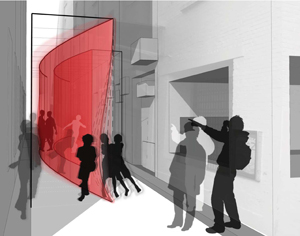
'The Meeting Place' – one of the entries into the City of Sydney's By George: Hidden Networks annual Laneways art exhibition.
Image: Courtesy of City of Sydney
By Rob O’Brien
Five regional and urban councils from across Australia will come together next month to showcase groundbreaking arts projects they have helped design to creatively engage their communities.
The councils – Charters Towers Regional Council (Qld), the City of Greater Geelong (Vic), Liverpool (NSW), Latrobe (Vic) and the rural city of Wangaratta (Vic) – will all present their initiatives as part of the Generations project at the Regenerating Community Conference in Melbourne.
The Generations project, created by the Cultural Development Network (CDN), was developed to explore the links between engagement in community-based arts activities and active civic engagement at a time when councils are under pressure on a number of different fronts.
Each council project has developed collaborations between local government, artists and communities based around global issues or ongoing concerns to the community.
“The main goal of the Generations project was to examine and explore the role of arts to civic engagement or local communities,” said CDN program manager Kim Dunphy.
“There’s been a lot of research previously into how the arts benefits health and wellbeing and economic development, but we felt this area of civic engagement with the big issues communities face was a link not well explored.”
Initiatives undertaken for the Generations project tackle issues such as climate change adaptation, improving indigenous relations, youth disengagement and providing for an ageing population.
Dunphy said the research component of the project would benefit future council initiatives.
“The intention is that people will learn from that research how to do things differently in the future,” she said.
The five councils have come together twice a year over the three-year period of the project to discuss progress and learnings.
Chris Gibson, associate professor in human geography at the University of Wollongong, said that an increased emphasis on the arts, particularly in remote communities, could not only improve engagement but could address issues such as skills shortages and unemployment.
“The arts were increasingly seen by local governments in the 80s and 90s as a way of creating social inclusion, connecting with migrant communities – there was a community development emphasis of the arts.
“In the last five years or so it has become much more linked to economic development strategies. Local governments are increasingly seeing arts programs as potential incubators for creative industries.”





Leave a Reply